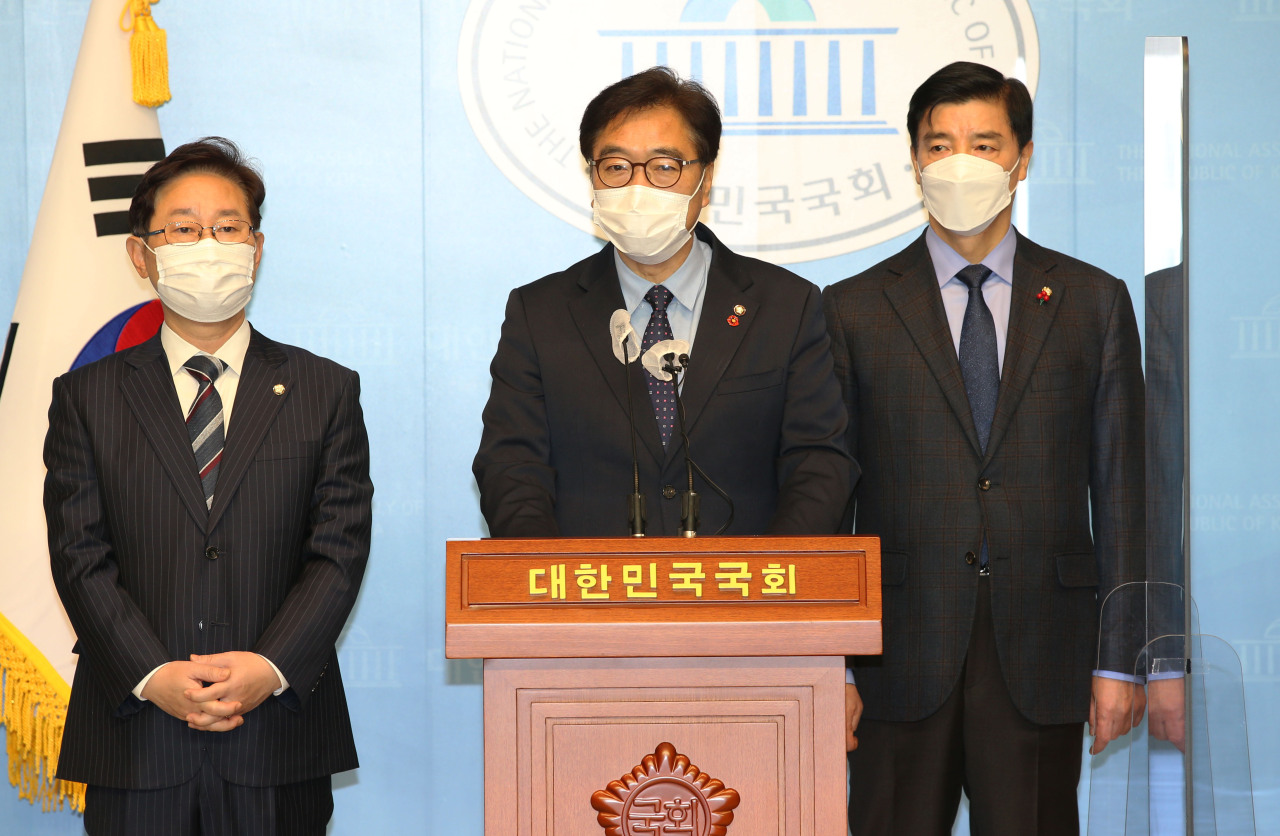 |
Democratic Party Rep. Woo Won-shik (center) speaks alongside Reps. Park Beom-kye (left) and Lee Hae-sik, members of a party steering group in charge of the Sejong relocation plan, during a press conference at the National Assembly in Seoul on Wednesday. (Yonhap) |
The ruling Democratic Party of Korea resolved on Wednesday to move 10 National Assembly standing committees to the administrative capital of Sejong, making its plan official in an effort to quell overpopulation in Seoul and achieve more balanced regional development.
A party relocation plan steering group submitted a comprehensive report to the party’s supreme council on moving the parliament out of Seoul to Sejong.
“The steering team has been working for about four months to realize the vision of balanced development that has been envisioned by (former Presidents) Park Chung-hee, Kim Dae-jung and Roh Moo-hyun,” Rep. Woo Won-shik, who leads the in-house group of lawmakers in charge of the project, said during a press conference.
The decentralization efforts began in 2012 and involved relocating Cabinet ministries and government agencies in stages to Sejong, some 130 kilometers south of Seoul. But the ambitious project was left half-done, with a score of ministries and the parliament still in the capital.
Demographic changes and skyrocketing home prices in Seoul led the ruling Democratic Party of Korea to revive the old plan, under which Sejong would be the true administrative capital of Korea.
The group proposed moving the parliament in two phases.
A total of 11 parliamentary committees would be moved to Sejong -- the Special Committee on Budget and Accounts and 10 other standing committees, including the Health and Welfare Committee, the Education Committee, the Environment and Labor Committee and the Strategy and Finance Committee.
The ruling party is excluding Cheong Wa Dae from its Sejong relocation plan, citing public polls that show a reluctance to accept the potential relocation of the presidential office.
The group said the committees’ relocation would resolve inefficiency stemming from the physical distance between the Cabinet ministries in Sejong and the committees that examine bills and petitions that those ministries are responsible for.
For the transfer, the ruling party plans to introduce an amendment bill enabling the establishment of a new unit of the National Assembly in Sejong. The rival parties have already allocated some 12.7 billion won ($1.17 million) in the 2021 budget for architectural costs in the event of the passage of the bill.
The second phase would be the complete transfer of the National Assembly to Sejong, which requires public opinion gathering and the formation of a National Assembly special committee to reach a consensus between the ruling and opposition parties.
The party also revealed its plans to transform Seoul into a global business hub.
Yeouido, where the National Assembly is currently located, is envisioned as a special financial zone that would adopt an innovative tax system and innovative regulations and offer legal services that meet global standards.
Under the plan, the current site of the parliament would morph into a “fourth industrial revolution” science and startup cluster, featuring new institutions such as a venture innovation center and a data exchange.
By Park Han-na (
hnpark@heraldcorp.com)








